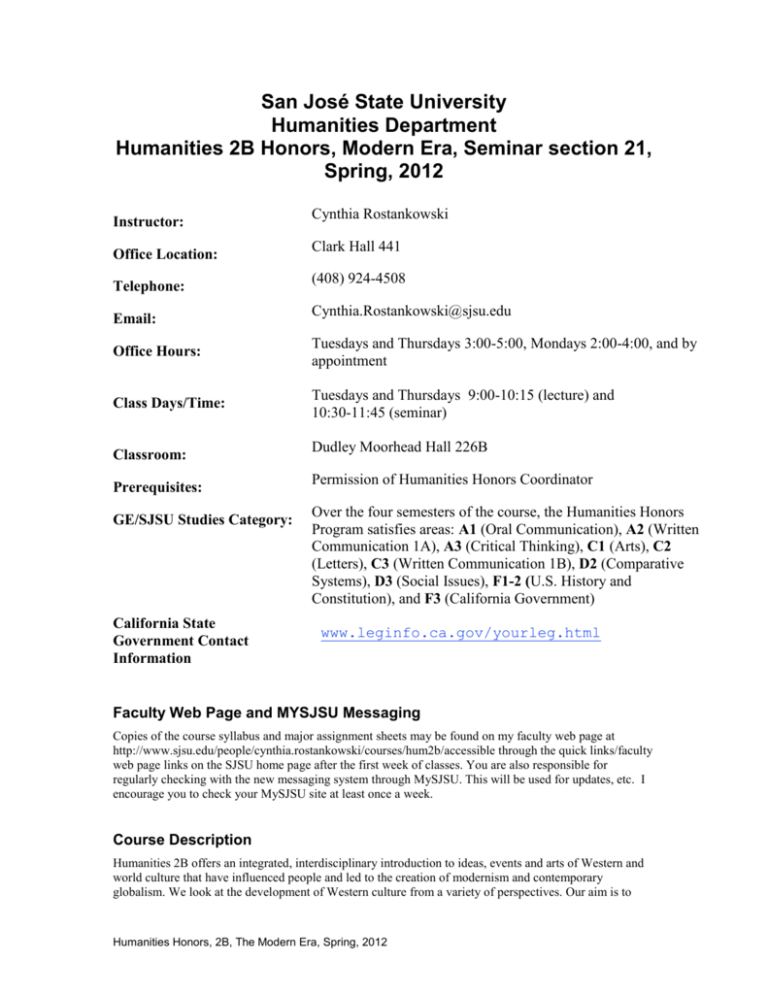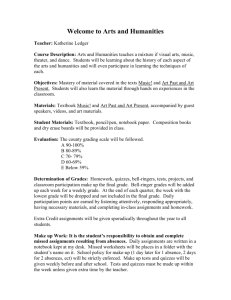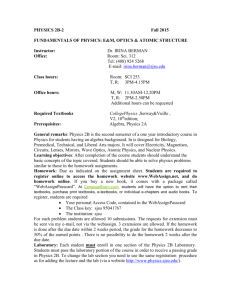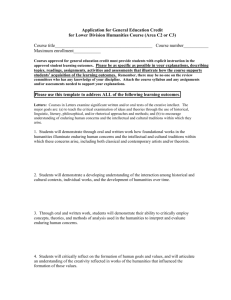
San José State University
Humanities Department
Humanities 2B Honors, Modern Era, Seminar section 21,
Spring, 2012
Instructor:
Office Location:
Telephone:
Email:
Cynthia Rostankowski
Clark Hall 441
(408) 924-4508
Cynthia.Rostankowski@sjsu.edu
Office Hours:
Tuesdays and Thursdays 3:00-5:00, Mondays 2:00-4:00, and by
appointment
Class Days/Time:
Tuesdays and Thursdays 9:00-10:15 (lecture) and
10:30-11:45 (seminar)
Classroom:
Prerequisites:
GE/SJSU Studies Category:
California State
Government Contact
Information
Dudley Moorhead Hall 226B
Permission of Humanities Honors Coordinator
Over the four semesters of the course, the Humanities Honors
Program satisfies areas: A1 (Oral Communication), A2 (Written
Communication 1A), A3 (Critical Thinking), C1 (Arts), C2
(Letters), C3 (Written Communication 1B), D2 (Comparative
Systems), D3 (Social Issues), F1-2 (U.S. History and
Constitution), and F3 (California Government)
www.leginfo.ca.gov/yourleg.html
Faculty Web Page and MYSJSU Messaging
Copies of the course syllabus and major assignment sheets may be found on my faculty web page at
http://www.sjsu.edu/people/cynthia.rostankowski/courses/hum2b/accessible through the quick links/faculty
web page links on the SJSU home page after the first week of classes. You are also responsible for
regularly checking with the new messaging system through MySJSU. This will be used for updates, etc. I
encourage you to check your MySJSU site at least once a week.
Course Description
Humanities 2B offers an integrated, interdisciplinary introduction to ideas, events and arts of Western and
world culture that have influenced people and led to the creation of modernism and contemporary
globalism. We look at the development of Western culture from a variety of perspectives. Our aim is to
Humanities Honors, 2B, The Modern Era, Spring, 2012
develop an understanding of the significant values, institutions and attitudes that have contributed to
producing the complex global culture we share today. During 2B, we consider responses to Imperialism
and Nationalism; the rise of the United States, and eventually, California; creative transformations in art,
literature and music; and the devastations of global wars.
Course Goals and Student Learning Objectives
This course will aim to accomplish the following: Each student will have the opportunity to consider some
of the significant ideas and other creations of humankind. Students will be able to become familiar with the
milieu that yielded these important works. Students will be able to recognize the contributions and
accomplishments of women and diverse cultural and religious groups in the movement of civilizations.
Also, an aesthetic and poetic awareness regarding the many means of communication will be cultivated.
Students will be encouraged to express their understanding, experiences and views in not only written
discourse but also in by means of public speaking and of course, in group discussions.
GE Learning Outcomes (LO)
LO1 Area A1: Oral Communication courses should cultivate an understanding of the social, psychological,
political and practical significance of communication, with special emphasis on the roles of public
communication in a free society.
LO2 Area A2: Written communication 1A courses should cultivate an understanding of the writing process
and the goals, dynamics, and genres of written communication, with special attention to the nature of
writing at the university.
LO3 Area A3: Critical thinking courses should help students learn to recognize, analyze, evaluate, and
produce reasoning.
LO4 Areas C1-2-3: Arts and Letters courses should give students knowledge and understanding of
significant works of the human intellect and imagination. Courses should enable students to participate in
social and cultural communities associated with artistic and literary endeavors, enriching their personal and
professional lives.
LO5 Area D2: Courses in this area will enable students to compare and contrast two or more ethnic
groups, cultures, regions, nations, or social systems.
LO6 Area D3: Social Issues courses will enable students to apply multidisciplinary material to a topic
relevant to policy and social action at the local, national, and/or international levels.
LO7 Area F1-2-3: Courses in American Institutions (US History, US Constitution, and California
Government) should expose students to alternative interpretations of the historical events and political
processes that have shaped the social, economic, and political systems in which we live.
Required Texts/Readings
Textbooks
Your Humanities 2B Reader is required for this course, and is available exclusively on line at my faculty
website: http://www.sjsu.edu/people/cynthia.rostankowski/courses/hum2b/
You will be asked to have reading assignments from this source available to you for class
discussion during seminar sessions. Please make sure you do so either by printing the relevant material for
the day, or having your electronic copy available in class on your computer desktop, but NOT on line.
Humanities 2B Reader,
http://www.sjsu.edu/people/cynthia.rostankowski/courses/hum2b/
Humanities Honors, 2B, The Modern Era, Spring, 2012
** = new this semester
Baird, F. E. and W. Kaufmann. Philosophic Classics: From Plato to Derrida, 6th ed. (Prentice Hall). ISBN
0205783864
**Conrad, Joseph. Heart of Darkness. (Dover). ISBN 0486264645
**Emerson, R. W. Self Reliance & Other Essays. (Dover). 0-486-27790-9
**Frankl, Viktor, Man’s Search for Meaning (Beacon) ISBN-13: 978-0807014295
**Freud, S. Civilization and Its Discontents (Norton). ISBN 0393301583
Gerston, L. and T. Christensen. California Politics and Government. 11th edition (Wadsworth). ISBN
0495913456
Harris, M., The Writer’s FAQ. A Pocket Handbook, 4th ed. (Pearson/Prentice Hall) ISBN 13: 978-0-20577785-3
Heffner, R., ed. A Documentary History of the U.S., 8th ed. (Signet). ISBN 0451228502
Honour, H., and J. Fleming. Visual Arts: A History, revised 7th ed. (Prentice Hall). ISBN 13: 978-0-20566535-8
**Humanities 2B Reader (online)
**Hwang, D. H. M. Butterfly (Dramatists Play Service) ISBN 0822207125
**Lawall, S., M. Mack, et al., eds. Norton Anthology of World Literature. 2nd ed., vols. E and F. (Norton)
Volume E: ISBN 0-393-92456-4
Volume F: ISBN 0-393-92457-2
**Remarque. All Quiet on the Western Front (Ballantine) ISBN 0449213943
**Woolf, Virginia. To the Lighthouse. (Harcourt Harvest) ISBN 0156907399
Other Readings
Any other readings for the course will be announced in class, and made available either as handouts, or in
an electronic format, as needed. To this end, students must be able to access the internet, and need a San
Jose State library card.
Library Liaison
The Humanities Librarian is Peggy Cabrera. Please feel free to contact her and make an appointment for
advice and assistance as you research your essay. Her email address is peggy.cabrera@sjsu.edu. Her office
phone number is 408-924-2249. She is also available by appointment in the King Library, at 408-808-2034.
Classroom Protocol
Each person is of intrinsic worth and is thus worthy of respect in all interactions; please keep this
awareness at the forefront of your considerations as you enter and exit your lecture and seminar classrooms,
and as you comport yourself in those classes (and in all of your other classes as well). Treat guests with
respect and courtesy. Respectful behavior includes silence when others are speaking, entering the room
quietly and inconspicuously, leaving the room during session only as a matter of greatest urgency, being
attentive to the class in progress, raising your hand if you wish to be acknowledged, and refraining from all
other interactions (personal and electronic) while class is going on. This specifically includes refraining
Humanities Honors, 2B, The Modern Era, Spring, 2012
from cell phone use in any way during class, and engaging in the use of your computer only for note-taking
and electronic text reference.
Dropping and Adding
Students are responsible for understanding the policies and procedures about add/drop, grade forgiveness,
etc. Refer to the current semester’s catalog policies section at
http://info.sjsu.edu/static/catalog/policies.html for University policies information. Specific add/drop
deadlines can be found under current academic calendar at
http://www.sjsu.edu/provost/Academic_Calendars/. Late drop policy is available at
http://www.sjsu.edu/aars/policies/latedrops/policy/. Students should be aware of the current deadlines and
penalties for dropping classes. Information about the latest changes is available at the Advising Hub,
http://www.sjsu.edu/advising .
Assignments and Grading Policy (See additional information in 2B Reader)
This course requires a significant amount of reading. Students are asked to read each scheduled assignment
prior to coming to class. This means that the readings listed by date on the reading assignment schedule are
to be read before the day those readings are listed. This also means that students are to strive to understand
the readings as well, not merely go through the motions of poring over pages. Since the readings are often
challenging, they should also be a source of questions to keep in mind while listening to lecture, and to ask
about during seminar. Expect to spend approximately four to six hours per week in doing only the readings
for this course. It is not possible to work effectively in this course if one were to rely on the lectures and
class discussions alone. A variety of writing assignments will be assigned for this course, and they will
differ among instructors, but all instructors will assign topics that meet the writing requirements for the
various core areas. Please see the chart in this section for additional information about the specific kinds
of written assignments you will be asked to accomplish. Students will also be asked to complete a lecture
mid term examination, and final examinations for both the lecture portion of the class as well as the
seminar portion. Students will also be required to complete one speech each semester. The specific
guidelines for each are to be found in the Humanities Course Reader (ONLINE at
http://www.sjsu.edu/people/cynthia.rostankowski/courses/hum2b/) for each semester.
In Humanities 2B, one speech will be required. The speech during Humanities 2B is an informative speech,
four to five minutes in length, related to topics of the semester, and requiring visual aids. Examples might
include the use of Powerpoint showing graphs, images or maps; also, very short videos for the speech may
be created. Through faculty, students will also have access to the technology available at the IRC. A
complete full sentence outline of at least two pages is required, as well as a bibliography of sources. In
preparation for their speeches, students will be provided with evaluation guidelines to help prepare and
assess work. Explanations of the speech requirements will be described in the Humanities Readers, as well
as in seminar discussions.
Written Assignments
Your written assignments for this course are listed in the table below. Some are indicated as “required,”
that is, they must be completed and turned in to your instructor in order for it to be possible for you pass the
course (although completing them is, of course, no guarantee of passing). Other assignments are indicated
as both “required and rewritable” and are both required and may be re-written so you may have the
opportunity to improve your work. As in the past two semesters, you will be required to present a speech,
and you must turn in an outline for your speech on the day of your presentation. More details about the
speech requirement are to be found in your speech assignment described in your 2B Reader. Although
completing journal assignments is not required, it will be difficult to succeed well in class without
accomplishing them, since they are based upon the scheduled readings, and their evaluative worth may
become pivotal in determining your end-of-semester grade. Failure to complete and turn in a journal in a
timely way will be recorded as an “F” for that work. Due dates for journals will be listed in the journal
handout.
Humanities Honors, 2B, The Modern Era, Spring, 2012
Please note that the professor may change any of the following information for the benefit of the class,
should the need arise. Any change will be announced in class, and via MySJSU, if necessary.
Assignments
Due
Date
Value
Speech (outline about 2 pages) required
Mid-term examination (in seminar) required
Final Exam (Lecture) required
Final Exam (Seminar) required
Critical Thinking Essay (3 pages) required and rewritable
Research Essay Project Topic (1-2 pages) required and rewritable
Research Essay Project: Research sources (1-2 pages) required and
rewritable
Research Essay Project: Essay (4-5 pages) required and rewritable
Experiencing Art Essay (three pages) required and rewritable
Journals, quizzes, etc. (ten in all, 1% of grade each)
English 1B Exam 10:00-12:00 location TBA; required
Class participation
day of
8 Mar.
22 May
21 May
28 Feb.
6 Mar.
20 Mar.
5%
10%
10%
10%
10%
5%
5%
10 Apr.
26 Apr.
day of
TBA
5%
5%
10%
10%
15%
Turnitin.com
You will be required to submit all writing assignments for this course electronically using Turnitin.com, as
well as submitting a hard copy of each assignment for grading and comments. Be sure to include all
citations and your bibliography. In order to receive credit for your work, you will also have to attach a
copy of the digital receipt that shows the percentage of similarity index match provided by Turnitin.com to
your assignment before submitting a hard copy.
Shortly after you upload your paper to Turnitin.com, you can access a color-coded report with details about
your use of sources in your paper. Your paper needs to be in the blue or green range to receive credit. If
you are in a higher range, Turnitin.com will show you where your paper is having trouble. Correct your
paper, and always cite your sources.
Turnitin.com is a tool to help you learn how to use research correctly and avoid plagiarism. To use
Turnitin.com, you will need to create a “user profile.” After your profile is created, you can log onto and
use the site.
The class ID is: 4723388
The Class Enrollment Password is: HUM2B-SP12
All coursework will be evaluated in terms of letter grades A+ through F, with the values of the letter grades
as follows:
A+ = 4.3
A= 4.0
A- = 3.7
B+ = 3.3
B = 3.0
B- = 2.7
C+ = 2.3
C = 2.0
C- = 1.7
D+ = 1.3
D = 1.0
D- = 0.7
F+ = 0.3
F=0
Humanities Honors, 2B, The Modern Era, Spring, 2012
University Policies
Academic integrity
Students should know that the University’s academic integrity policy is available at the following website:
http://www.sjsu.edu/senate/S07-2.htm . Your own commitment to learning, as evidenced by your
enrollment at San Jose State University and the University’s integrity policy, require you to be honest in all
your academic course work. Faculty members are required to report all infractions to the office of Student
Conduct and Ethical Development. The website for Student Conduct and Ethical Development is available
at http://www.sjsu.edu/studentconduct/.
Instances of academic dishonesty will not be tolerated. Cheating on exams or plagiarism (presenting the
work of another as your own, or the use of another person’s ideas without giving proper credit) will result
in a failing grade and sanctions by the University. For this class, all assignments are to be completed by the
individual student unless otherwise specified. If you would like to include in your assignment any material
you have submitted, or plan to submit for another class, please note that SJSU’s Academic Policy F06-1
requires approval of instructors.
Campus Policy in Compliance with the American Disabilities Act
If you need course adaptations or accommodations because of a disability, or if you need to make special
arrangements in case the building must be evacuated, please make an appointment with me as soon as
possible, or see me during office hours. I will be happy to work with you. Presidential Directive 97-03
requires that students with disabilities requesting accommodations must register with the Disability
Resource Center, www.drc.sjsu.edu to establish a record of their disability.
Student Technology Resources
Computer labs for student use are available in the Academic Success Center located on the 1 st floor of
Clark Hall and on the 2nd floor of the Student Union. Additional computer labs may be available in your
department/college. Computers are also available throughout the Martin Luther King Library and, for
students with disabilities, at the Adaptive Technology Center on the second floor. A wide variety of audiovisual equipment is available for student checkout for class use from Media Services located in IRC 112.
These items include digital and VHS camcorders, VHS and Beta video players, 16 mm, slide, overhead,
DVD, CD, and audiotape players, sound systems, wireless microphones, projection screens and monitors.
Learning Assistance Resource Center
The Learning Assistance Resource Center (LARC) is located in Room 600 in the Student Services Center.
It is designed to assist students in the development of their full academic potential and to motivate them to
become self-directed learners. The center provides support services, such as skills assessment, individual or
group tutorials, subject advising, learning assistance, summer academic preparation and basic skills
development. The LARC website is located at http:/www.sjsu.edu/larc/.
SJSU Writing Center
The SJSU Writing Center is located in Room 126 in Clark Hall. It is staffed by professional instructors and
upper-division or graduate-level writing specialists from each of the seven SJSU colleges. Writing
specialists have met a rigorous GPA requirement, and they are well trained to assist all students at all levels
within all disciplines to become better writers. The Writing Center website is located at
http://www.sjsu.edu/writingcenter/about/staff//.
Peer Mentor Center
The Peer Mentor Center is located on the 1st floor of Clark Hall in the Academic Success Center. The Peer
Mentor Center is staffed with Peer Mentors who excel in helping students manage university life, tackling
Humanities Honors, 2B, The Modern Era, Spring, 2012
problems that range from academic challenges to interpersonal struggles. On the road to graduation, Peer
Mentors are navigators, offering “roadside assistance” to peers who feel a bit lost or simply need help
mapping out the locations of campus resources. Peer Mentor services are free and available on a drop –in
basis, no reservation required. http://www.sjsu.edu/muse/peermentor/.
Humanities Honors, 2B, The Modern Era, Spring, 2012









